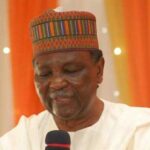
As if in a play-out of the cliché which holds that old habits hardly die, Chief Olusegun Obasanjo has returned to the nation’s public space with his penchant for generating undue controversy, and as some say, in order to attract public attention to himself. Recently he successfully achieved that goal when he went to town with some scathing comments on governance in the country, but with his traditional broadside against the National Assembly – his adopted whipping boy.
Exploiting the opportunity of addressing guests at a public function, he rained invectives on the National Assembly as an institution as well as the individual legislators. This is just as he also gave President Muhammadu Buhari the length of his tongue.
With respect to the National Assembly he was reported to have said “Once you are a member, you are co-opted and your mouth is stuffed with rottenness and corruption that you cannot opt out as you go home with not less than N15million a month for a senator and N10million a month for a member of the House of Representatives. The National Assembly is a den of corruption by a gang of unarmed robbers…’’. Weighty allegations one would say, and coming from Obasanjo with his intimidating credentials as a Nigerian leader and patriot it is not difficult to see that many Nigerians may believe the comment – hook, line and sinker.
Ordinarily, Obasanjo is one individual whose opinion is taken seriously by many Nigerians and foreigners alike as they cite his admissibly intimidating credentials and antecedents to accord him oracular status. However, in recent times his interventions in the public domain have betrayed a tendency to be selectively antagonist towards people with whom he has an axe to grind or no more shares common convictions with. This tendency has significantly eroded the desired altruism and panache from his public interventions and detracted from their supposed oracular significance.
And when an oracular personage condescends from providing credible guidance and degenerates to a state which late Dr Nnamdi Azikiwe – Nigeria’s first president would put as coming “from an Olympian height to employ the language of a gutter snipe”, then there is clearly a problem. The usual unique selling point of interventions by oracular figures in the public domain lies in the insights they provide in order to advance the cause of society. Unfortunately, Obasanjo’s interventions have long lost that attraction.
And that is why it was important that the National Assembly provided a measured response to his latest adventure in mischief through the Chairman House of Representatives Committee on Media and Public Affairs Honourable Abdulrazak Namdas. The response will save the public from this latest campaign of misinformation by discrediting the plank of Obasanjo‘s grouse,being his baseless claim that Senators and Members of the House of Representatives received monthly salaries of N15 million and N10 million respectively. It is trite knowledge that the remuneration of legislators is statutorily under the purview of the Revenue Mobilisation and Fiscal Commission (RMFC). Beyond aiming to score a political point it remains out of the ordinary for a former President of the country to twist facts out of context, before the public.
However, at this stage the problem lies less with Obasanjo and more with the Nigerian public, as the man seems to enjoy launching invectives at any unsuspecting person that catches his fancy. Public commentaries on the development have flowed in torrents with some even eulogising him as a hero for attacking the National Assembly. This should not be surprising as in a world of free speech, there is also the liberty of credulity which may misguide the unwary into unhelpful considerations, conclusions and even beliefs; especially when the enterprise is bereft of guidance by facts and figures. That is the lot of whoever eulogises Obasanjo in respect of this recent, unfortunate public outburst.
For instance, in his utterance Obasanjo claimed that Senators and Members of the House of Representatives collected on a monthly basis the sums of N15 million and N10 million respectively. What he semantically concealed is the fact that the legislators are not in the National Assembly and collect these funds in their individual capacities, but do so as legitimate representatives of various senatorial and federal constituencies which are distributed throughout length and breath as well as the nooks and crannies of this great country, with each manifesting equally unique challenges and circumstances. It is therefore the height of uninformed presumptuousness for Obasanjo who hails from Ogun State, or any other critic of the legislature to sit in one part of the country and pontificate on matters that border on the relationships between legislators and their constituencies outside his or her locality.
For Obasanjo, his age-old problem with the legislators is that he sees them as individuals who should be amenable to sundry manipulations, forgetting that by the provisions of the Constitution once elected into office, they translate into veritable potentates that qualify to be negotiated with and from the perspective of their constituencies which they represent. It was his failure to appreciate this reality that led to the series of battles he had with the National Assembly during his eight-year tenure as President.
He had come to office in 1999 then with a concealed mandate to wipe out every likely opposition to his authority and started with retiring all military officers who had held any political office before then and were still serving. This move terminated the blossoming military career of scores of promising officers. Then he conceived the idea of neutralising the National Assembly which he saw as the only likely obstacle to his dictatorial approach to governance. Fortunately for Nigerians the Fourth and Fifth National Assemblies managed his vaunting ambition to compromise the emerging democratic dispensation in the country, including thwarting the infamous attempt to extend his stay in office unlawfully through a third term agenda.
Then were the series of budget wars during which he was believed to have routinely directed the MDAs under the Executive to ignore whatever budget was approved by the National Assembly. Indeed, it was an open secret that throughout his eight years in office, his administration operated two different budgets. While one was submitted for passage by the National Assembly the MDAs were implementing a different version that suited his whims and caprices.
Obasanjo’s grouse with the National Assembly bears a strong resemblance to the story of the dog and grapes by Aesop the Greek fabulist of antiquity. According to the story, a hungry dog saw a tree with ripe grapes dangling seemingly within his reach, and jumped several times to pluck even one to satisfy his hunger. When he eventually failed in his bid he left, sighing and muttering that the grapes were sour.
 Join Daily Trust WhatsApp Community For Quick Access To News and Happenings Around You.
Join Daily Trust WhatsApp Community For Quick Access To News and Happenings Around You.


